Photographs: Shobha Warrier/Rediff.com Shobha Warrier/Rediff.com
Kudumbashree, the largest network of women in India, is a revolution worth copying wherever there are women in need of help.
Shobha Warrier/Rediff.com travelled to Thrissur, Kerala, to encounter the amazing success story of women who once lived in dire straits, but who now own homes, cars and make enough money to change their lives forever. All thanks to Kudumbashree.
Bindu's story is as inspiring as it is astounding.
Bindu lives in Mullassery, a village near Thrissur.
There was a time in her life when she could not afford even a single meal a day. Today she can stock up rice for a year!
She didn't own an inch of land. Today, she owns 22 acres of land!
She didn't have a home of her own. Today, she has a two storey home!
She used to walk to the farm when she started, but today, she has bought herself a car and a scooter, and she uses the scooter to travel to her farm.
Because of poverty, she couldn't study beyond Class 7, but today, her son is an engineering student studying computer science.
Bindu belonged to a large family of five brothers and three sisters. While her father toiled hard as a landless labourer, her mother sold tea. But the money they brought home was so little that the family didn't even have one proper meal on most days.
"Though I was the 6th child, I knew how tough it was for my mother to give us at least one meal a day," she recalls.
As her parents could not afford to send all eight of their children to school, she had to stop her schooling despite being a good student who had dreams of studying further. It was young Bindu's duty to do the housework when her parents and elder brothers went outside to work.
Life went on thus until she was married off to Sathyan, who lived nearby, at the age of 18.
"From one poor house to another, that was my journey. With my husband making just Rs 800 a month polishing diamonds, two children, and his family on top of that to take care of, do I even need to tell you how difficult the days were? With both my children suffering from epilepsy, most of my days were spent visiting the hospital."
In 1998, Kudumbashree started a group in her area, but Bindu could hardly find the ten rupees a week she needed in order to join the group.
"All of us were in such dire straits financially that it was not just me, but the other women too found it difficult to save ten rupees. If we didn't pay the money for two weeks in a row, we faced eviction from the group. Somehow, I managed to continue with the group."
Please ...
'If a woman yells out, somebody should hear her'
Image: Bindu (in a green sari) with her friends Sheeba and Sreeja.Photographs: Shobha Warrier/Rediff.com Shobha Warrier/Rediff.com
Bindu and her friends used to listen to the block officers talk about starting farming but they never thought they would be able to do it.
"It was by accident that we became farmers. In 2000, we had gone to a studio to take a photo of ourselves together. The studio owner told us that he had some land that he wished to lease out for farming. He wanted us to tell some of our Kudumbashree members. We came home with the thought running through our minds. After a lot of deliberation, we decided to try our hand at collective farming."
It was a major decision for Bindu and her friends -- Sheeba, Sreeja and Mallika.
They decided to join hands and lease 8 acres of land that was overgrown with weeds.
The idea was to cultivate paddy.
Though they bought seeds at a discounted price from Krishi Bhavan, they had to take a loan of Rs 10,000 each from Kudumbashree's informal bank, Rs 25,000 from its revolving fund, and some more from a normal bank.
There was no machinery to cut the weeds; so they used their sickles. When other workers went to their farms at 8 am, they started as early as 6 am.
Leaving their small children at home, these four women worked from morning till evening and yet couldn't clear the land of weeds. So, they had to employ people. Again, the entire paddy cultivation was done by hand.
As they had no previous experience in farming, they had to take advice and help from others at every step. But they learnt well and fast.
Altogether, they spent Rs 200,000 on their first effort.
Once the harvest was ready, what they did first was not to sell the rice to make a profit. None of them had forgotten the days when they could not afford even a meal a day. All four of them decided to store some rice at home to last the entire year.
They sold the rice that remained, and used it to clear all the debts.
Bindu won the Best Farmer award from the Grama Panchayat that year!
Please ...
'If a woman yells out, somebody should hear her'
Image: The biggest change in the lives of Bindu and her friends is the freedom they enjoy.Photographs: Shobha Warrier/Rediff.com Shobha Warrier/Rediff.com
"After that, we didn't feel like coming out of the paddy field," says Bindu. "The result was beyond our wildest dreams. We started dreaming of owning our own land, and somehow we felt that was achievable."
Full of confidence, they were ready for a bigger attempt next year; this time they leased 15 acres of land.
Again, they made a good profit from the produce.
Every year, they started making more than a lakh (Rs 100,000) of rupees in profit. Last year, they made Rs 20 lakh (Rs 2 million) from paddy cultivation, with a profit of Rs 150,000 for each of them.
In between, they also cultivated vegetables on another plot, with Krishi Bhavan helping them once again with seeds and fertilisers. Once the vegetables were harvested, they hired a vehicle, drove the veggies to the market, and sold them at a profit of Rs 4,000.
In 2002, Bindu bought her first piece of land -- 1 acre for Rs 22,000. The next year, all three of them together bought another 3 acres of land. Now that they turn over profits in lakhs of rupees, they cultivate paddy on 30 acres of leased land.
With the agricultural department promoting mechanised cultivation, this year, they had a bumper crop.
With the profit she made last year, Bindu bought herself a scooter, and her family a car.
There has never been any problems between the friends; no clashes either on money or ego.
The reason, they say, is this" "We make it a point to write down each and every paisa spent and saved. We also minute every visit and discussion we have. After the sales, all the four of us sit down to calculate how much we spent and how much profit we made. Not a single paisa is unaccounted for. That is how we have worked together for 14 years."
When Bindu was made chairperson of her local Kudumbashree unit, she decided to complete her schooling, and passed the Class 10 exam with flying colours.
"I am not sure whether I should do it at this advanced age, but I want to get through my Plus 2 exams too!" she says.
Bindu also learnt to drive the tiller machine and also climb coconut trees.
The biggest change in the lives of these four women is the freedom they enjoy.
"There was a time when we were shouted at if we were a bit late coming back home. With the kind of success we have achieved, nobody questions us any more. Our lives have changed beyond all recognition. We never ever thought that we would have three proper meals to eat, a two storey house, a car, a motorbike, a scooter, jewellery, and above all, our children studying to become engineers."
"But there is no life without farming for us. This is our livelihood, our life. We can only thank Kudumbashree for this miraculous transformation," they say.
As the chairperson of 164 NHGs of Kudumbashree at the Panchayat level, Bindu goes out on her scooter to meet other women and motivate them to come out of their homes and be independent!>br />
"That is one motto of mine; inspire more women," she says.
Bindu's is just one success story; there are thousands of Bindus out there in Kerala now; all because of an idea called Kudumbashree.
Please click NEXT to find out more about Kudumbashree...
'If a woman yells out, somebody should hear her'
Image: A newspaper advertisement urges people to buy products made by those under the Kudumbashree initiative.Photographs: The Kudumbashree Web site Shobha Warrier/Rediff.com
When Prime Minister Narendra Modi praised Kerala for its successful Kudumbashree model, not many in India knew what he was referring to.
Kudumbashree in Malayalam means 'prosperity of the family'.
The Kudumbashree movement made its quiet beginnings 22 years ago as the Kerala government's initiative 'to eradicate poverty holistically and empower women through concerted community action'.
Today, it is a revolution worth replicating wherever there are poor women in need of help.
With assistance from the United Nations Children's Fund, Kudumbashree was started as a very small initiative in seven wards in Alleppey in Alappuzha district.
Uniquely, it offered opportunities to not just the poor, but to women who did not live in pucca houses (ones made of cement, concrete and iron rods), had no potable water, dealt with alcohol-related issues in the family, or had disabled or mentally challenged children.
In no time, the programme spread to entire Alleppey municipality, and today, it is the largest network of women in India -- possibly in Asia -- with 4 million women actively participating in its initiatives.
The women call themselves the Neighbourhood Groups as opposed to Self-Help Groups, as the idea is to group women of a given neighbourhood together.
"It is in tune with the Malayalam phrase, oru vilipadakale (an echo away), which roughly translates to 'If a woman yells out, somebody else should hear her'," K B Valsala Kumari, the current executive director of Kudumbashree, tells Rediff.com
Please ...
'If a woman yells out, somebody should hear her'
Image: Bindu and her friends cleared their debts off with their first harvest.Photographs: Shobha Warrier/Rediff.com Shobha Warrier/Rediff.com
Kudumbashree has a three-tier structure with neighbourhood groups at the bottom, followed by the Area Development Society that has nominated office bearers from the NHG in the middle, and a Community Development Centre comprised of the officers bearers of all of the ADSes.
The CDSes, of which there are 1,072 (all registered as charities), work closely with their local Panchayats.
In fact, the Panchayati Raj's anti-poverty sub plan and women empowerment plan are based on Kudumbashree's sub plan.
Additionally, there is a mission in every district, which is in constant contact with each of the Kudumbashree units.
The three-tier Kudumbashree system operates informal banks to help poor members in need.
These banks, called Women's Thrift, are funded by members pooling together their resources (as low as Rs 10 to start with).
Today, the banks' funds run to Rs 1,500 crore (Rs 15 billion).
Kudumbashree units pay out subsidies and crop insurance to needy women out of their own savings, Women's Thrift funds, and loans from conventional banks.
The doors to these banks are open 24 hours a day, 7 days a week, and 365 days a year. It does not need an office building, furniture and other paraphernalia that we normally associate with a formal bank.
Please ...
'If a woman yells out, somebody should hear her'
Image: A garment manufacturing unit, run under the aegis of the Kudumbashree initiative in Thrissur.Photographs: The Kudumbashree Web site Shobha Warrier/Rediff.com
Kudumbashree members do everything from collective farming to sanitation work, IT enterprises and various micro-industrial units.
Throughout Kerala, there are 50,000 such micro-enterprises run by Kudumbashree members.
Collective farming remains one of Kudumbashree's most successful ventures, with around 11,000 farmers, 807 farmer facilitation centres, and 47,000 joint liability groups (a collective of women interested in farming). Most women lease the land, as they are normally landless labourers to start with.
With the help of the Agriculture University near Thrissur and the agriculture officers of the region, Kudumbashree provides technical guidance to women farmers.
To market their products, panchayats help them with weekly markets and monthly markets.
In addition to these markets, there are fairs and festivals organised by the Kerala government.
"One of the best ways of getting out of poverty," says Valsala Kumari, "is by agriculture. By empowering women, we aim to uplift the entire family as well as the wider community."

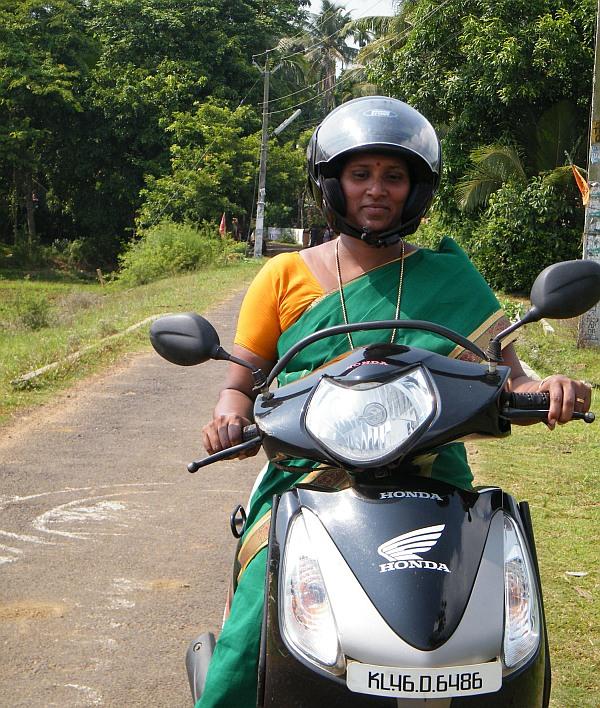
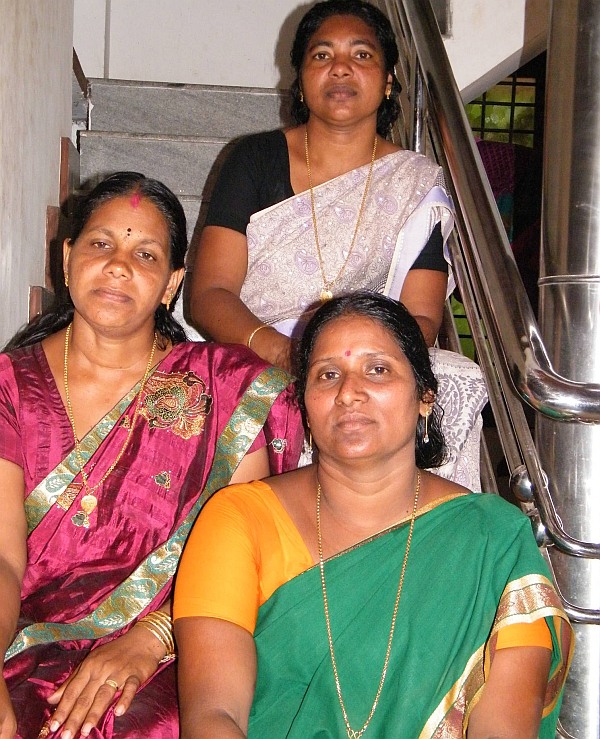
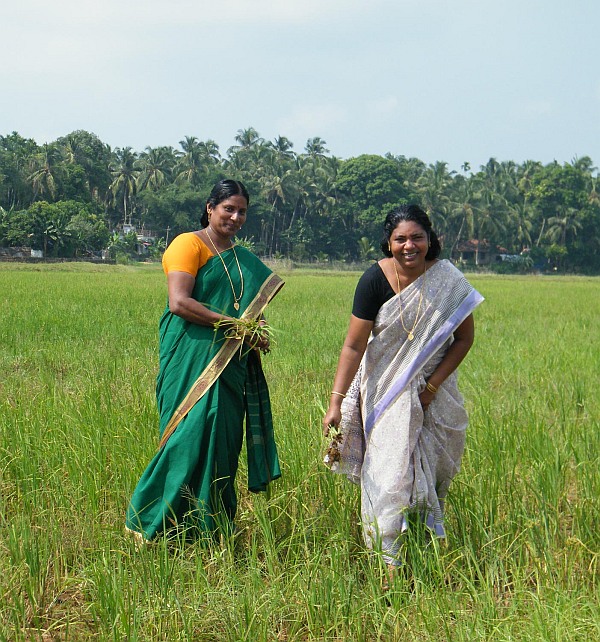
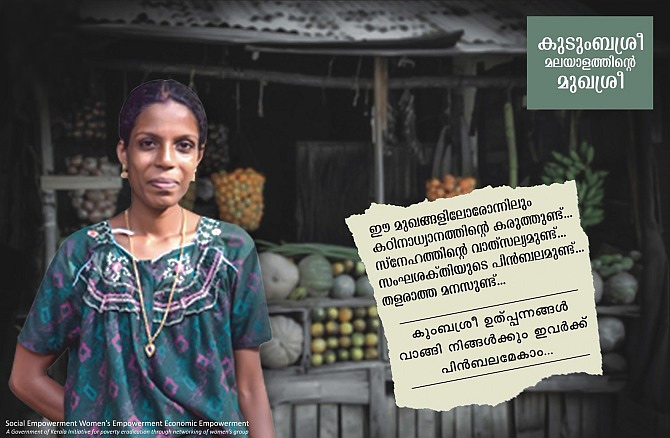
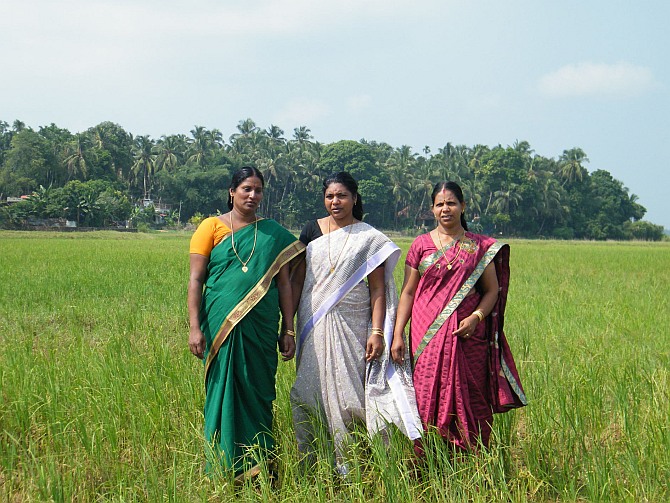

article